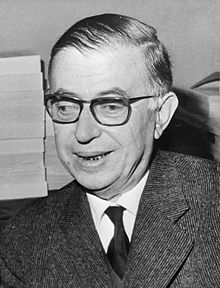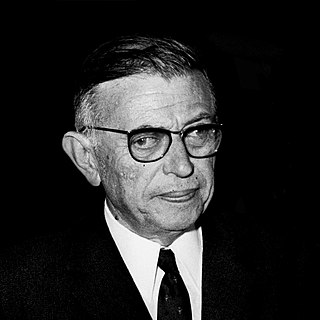
Jean-Paul Charles Aymard Sartre was a French philosopher, playwright, novelist, screenwriter, political activist, biographer, and literary critic, considered a leading figure in 20th-century French philosophy and Marxism. Sartre was one of the key figures in the philosophy of existentialism. His work has influenced sociology, critical theory, post-colonial theory, and literary studies. He was awarded the 1964 Nobel Prize in Literature despite attempting to refuse it, saying that he always declined official honors and that "a writer should not allow himself to be turned into an institution."

Simone Lucie Ernestine Marie Bertrand de Beauvoir was a French existentialist philosopher, writer, social theorist, and feminist activist. Though she did not consider herself a philosopher, nor was she considered one at the time of her death, she had a significant influence on both feminist existentialism and feminist theory.

Jorge Mario Pedro Vargas Llosa, 1st Marquess of Vargas Llosa, more commonly known as Mario Vargas Llosa, is a Peruvian novelist, journalist, essayist and former politician. Vargas Llosa is one of Latin America's most significant novelists and essayists and one of the leading writers of his generation. Some critics consider him to have had a larger international impact and worldwide audience than any other writer of the Latin American Boom. In 2010, he won the Nobel Prize in Literature, "for his cartography of structures of power and his trenchant images of the individual's resistance, revolt, and defeat." He also won the 1967 Rómulo Gallegos Prize, the 1986 Prince of Asturias Award, the 1994 Miguel de Cervantes Prize, the 1995 Jerusalem Prize, the 2012 Carlos Fuentes International Prize, and the 2018 Pablo Neruda Order of Artistic and Cultural Merit. In 2021, he was elected to the Académie française.
French literature generally speaking, is literature written in the French language, particularly by citizens of France; it may also refer to literature written by people living in France who speak traditional languages of France other than French. Literature written in the French language by citizens of other nations such as Belgium, Switzerland, Canada, Senegal, Tunisia, Algeria, Morocco, etc. is referred to as Francophone literature.
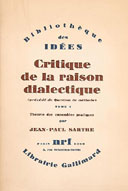
Critique of Dialectical Reason is a 1960 book by the philosopher Jean-Paul Sartre, in which the author further develops the existentialist Marxism he first expounded in his essay Search for a Method (1957). Critique of Dialectical Reason and Search for a Method were written as a common manuscript, with Sartre intending the former to logically precede the latter. Critique of Dialectical Reason was Sartre's second large-scale philosophical treatise, Being and Nothingness (1943) having been the first. The book has been seen by some as an abandonment of Sartre's original existentialism, while others have seen it as a continuation and elaboration of his earlier work. It was translated into English by Alan Sheridan-Smith.
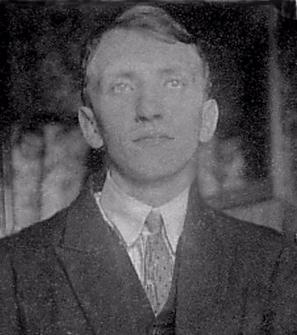
Maurice Blanchot was a French writer, philosopher and literary theorist. His work, exploring a philosophy of death alongside poetic theories of meaning and sense, bore significant influence on post-structuralist philosophers such as Gilles Deleuze, Michel Foucault, Jacques Derrida and Jean-Luc Nancy.
The Roads to Freedom is a series of novels by French author Jean-Paul Sartre. Intended as a tetralogy, it was left incomplete, with only three complete volumes and part one of the fourth volume of the planned four volumes published in his lifetime and the unfinished second part of the fourth volume was edited and published a year after his death.

Nausea is a philosophical novel by the existentialist philosopher Jean-Paul Sartre, published in 1938. It is Sartre's first novel.

New Directions Publishing Corp. is an independent book publishing company that was founded in 1936 by James Laughlin (1914–1997) and incorporated in 1964. Its offices are located at 80 Eighth Avenue in New York City.

What Is Literature?, also published as Literature and Existentialism,1] is an essay by French philosopher and novelist Jean-Paul Sartre, published by Gallimard in 1948.2] Initially published in freestanding essays across French literary journals Les Temps modernes, Situations I and Situations II, essays "What Is Writing?" and "Why Write?" were translated into English and published by the Paris-based literary journal Transition 1948.3] The English translation by Bernard Frechtman was published in 1950.4]
French philosophy, here taken to mean philosophy in the French language, has been extremely diverse and has influenced Western philosophy as a whole for centuries, from the medieval scholasticism of Peter Abelard, through the founding of modern philosophy by René Descartes, to 20th century philosophy of science, existentialism, phenomenology, structuralism, and postmodernism.

The Nobel Prize in Literature, here meaning for Literature, is a Swedish literature prize that is awarded annually, since 1901, to an author from any country who has, in the words of the will of Swedish industrialist Alfred Nobel, "in the field of literature, produced the most outstanding work in an idealistic direction". Though individual works are sometimes cited as being particularly noteworthy, the award is based on an author's body of work as a whole. The Swedish Academy decides who, if anyone, will receive the prize.
The Childhood of a Leader is a short story or novella of a little over a hundred pages by Jean-Paul Sartre. It is the final story in Sartre's collection that reflects a significant change from non-existence to existence through chronicling the life of Lucien Fleurier since he was a child until he became an anti-Semitic Camelot who believes that he can become a real leader. The work was published in 1939 with four other short stories in a collection entitled The Wall.
Committed literature can be defined as an approach of an author, poet, novelist, playwright or composer who commits their work to defend or assert an ethical, political, social, ideological or religious view, most often through their works but also can loosely be defined as being through their direct intervention as an "intellectual", in public affairs. Historically, a work is said to have achieved the status of committed within the sphere of committed literature when it has social of political influence for the defence or assertion of the aforementioned view. It can also achieve this status when the importance on a given subject is recognised and it has "open-ended engagement with contemporary history”. It has also been defined as the author, composer, poet, writer or playwright taking sides in order to take action. Additionally, it has been argued that committed literature rose to popularity within socialist circles within the fifties which aligns with the strong political movements characteristic of the time period. Taha Hussain in June 1947 may have been the first to use the term within his Les Temps Moderns. The concept was then led not long after by some existentialist writers like Jean- Paul Sartre exploring the definition in his work What Is Literature? and Lebanese literary magazine Al Adab as one of the followers of this approach.

The 1964 Nobel Prize in Literature was awarded the French writer Jean-Paul Sartre (1905–1980) "for his work which, rich in ideas and filled with the spirit of freedom and the quest for truth, has exerted a far-reaching influence on our age".

The 1957 Nobel Prize in Literature was awarded the French writer Albert Camus (1913–1960) "for his important literary production, which with clear-sighted earnestness illuminates the problems of the human conscience in our times." He is the ninth French author to become a recipient of the prize after Catholic novelist François Mauriac in 1952, and the fourth philosopher after British analytic philosopher Bertrand Russell in 1950.
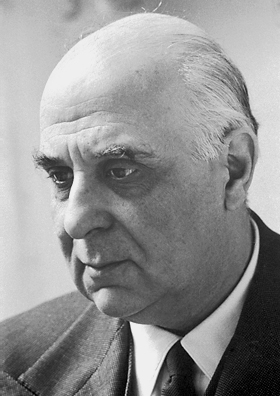
The 1963 Nobel Prize in Literature was awarded the Greek poet and diplomat Giorgos Seferis (1900–1971) "for his eminent lyrical writing, inspired by a deep feeling for the Hellenic world of culture." He is the first Greek laureate to win the Nobel Prize.

